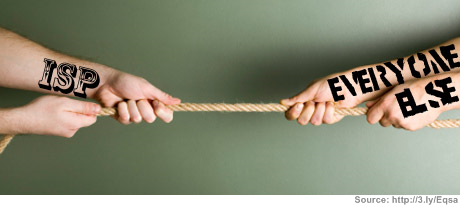Net neutrality may end in the UK: Universities will suffer

Ed Vaizey, the communications minister for UK government favours a 'two tier' system which would essentially be the death of net neutrality in Great Britain. In a nutshell, this will allow big bandwidth users including public and third sector organisations pay far greater bills for what they use, but giving them greater priority over non-subscribing ordinary web users' traffic.
It's been a great week to bury bad news. The United Kingdom is still running on a nationwide high after the announcement of the Royal wedding; something seen as a light at the end of the tunnel full of economic doom and gloom.

Though it is only in consideration in the United States as in the United Kingdom, it could set a dangerous precident for equality among all Internet users, from small start-up's and major public sector organisations, to the end user at home.
To really simplify this particular case as there are many different and varying angles to take into account, some argue that for the Internet to become more stable and progress to 'Internet 2.0' infrastructure-wise, the thought is that those organisations which use more bandwidth can pay more to prioritise their traffic over everyone elses. This will pay for better broadband services to the consumer without the need to hike the tax bill, like the 50p a month broadband tax.
- Read more: ZDNet Hot Topic Center on net neutrality
However, this could be forced upon organisations in form of government policy and law without an opt-in system. On the whole, the system may work and may not, and there's no particular way to work out if it will until it either does or doesn't.
Regardless of either argument, if policy does dictate this to become a law or the government forces ISP's to prioritise high bandwidth traffic over consumer usage thus causing bills to raise, universities could pay a steep price when they already face massive budget cuts and economic deficits.
It doesn't seem as though policy will dictate a compulsorary service, though ISP's may be free to prioritise traffic if they so wish. This could still be a major funding issue for non-private enterprise.
The BBC as a good example of being a major public sector organisation though entirely independent of government would be hit with massive bills for the iPlayer on-demand television and radio service. Considering the licence fee goes towards not only services and other broadcasting and online services the BBC provides, the licence fee would have to somehow subsidise the bandwidth charges - even though the fee has been frozen until 2016.
Universities often have huge pipelines, sometimes multiple high-speed broadband and fibre lines into their respective locations to allow the tens of thousands of students and staff to use the web from their halls of residence, the library or on the computer labs around the capus.
However to further the concern, the top EU policy maker, Neelie Kroes, who controls the digital agenda for all European member states will not allow laws to be introduced to prevent the death of network neutrality. Instead, the EU will adopt guidelines to prevent anti-competitive behaviour and to protect industries from the aggression of others.